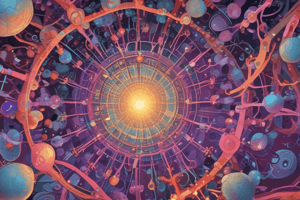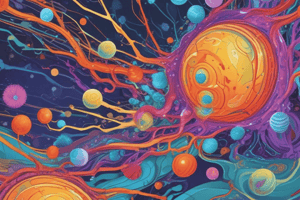Podcast
Questions and Answers
What is the main function of the variable region of an antibody?
What is the main function of the variable region of an antibody?
- To allow for the clumping of multiple pathogens
- To serve as a binding site for specific antigens (correct)
- To provide stability to the antibody structure
- To facilitate the neutralization of toxins
Which statement best describes the hinge regions of antibodies?
Which statement best describes the hinge regions of antibodies?
- They consist of identical amino acid sequences across all antibodies
- They enable flexibility to allow binding with multiple antigens (correct)
- They are rigid and do not allow movement between chains
- They contain the antigen binding site
How do antibodies contribute to agglutination?
How do antibodies contribute to agglutination?
- By neutralizing the toxins produced by bacteria
- By binding to multiple pathogens and clumping them together (correct)
- By marking pathogens for destruction without directly binding
- By directly destroying pathogens via enzymatic action
What role do antibodies play in neutralizing viral infections?
What role do antibodies play in neutralizing viral infections?
Which component of antibodies is constant across all antibody types?
Which component of antibodies is constant across all antibody types?
What is a unique structural feature of antibodies that aids in their function?
What is a unique structural feature of antibodies that aids in their function?
In what manner can antibodies mark pathogens for immune response?
In what manner can antibodies mark pathogens for immune response?
What happens when antibodies bind to endotoxins produced by pathogens?
What happens when antibodies bind to endotoxins produced by pathogens?
What is the primary characteristic that distinguishes monoclonal antibodies from polyclonal antibodies?
What is the primary characteristic that distinguishes monoclonal antibodies from polyclonal antibodies?
Which of the following best describes the hybridoma method used in the production of monoclonal antibodies?
Which of the following best describes the hybridoma method used in the production of monoclonal antibodies?
What is one key function of monoclonal antibodies in cancer treatment?
What is one key function of monoclonal antibodies in cancer treatment?
Which statement accurately reflects the application of monoclonal antibodies in medical diagnosis?
Which statement accurately reflects the application of monoclonal antibodies in medical diagnosis?
What role does the spleen play in the production of monoclonal antibodies?
What role does the spleen play in the production of monoclonal antibodies?
Which of the following correctly describes the binding ability of polyclonal antibodies?
Which of the following correctly describes the binding ability of polyclonal antibodies?
How are monoclonal antibodies utilized in treating poisoning?
How are monoclonal antibodies utilized in treating poisoning?
Which statement about the mass production of monoclonal antibodies is incorrect?
Which statement about the mass production of monoclonal antibodies is incorrect?
Flashcards
Antibodies
Antibodies
Glycoproteins that recognize and bind to specific antigens, playing a crucial role in the immune response.
Variable Region
Variable Region
The region of an antibody that binds to antigens; analogous to an enzyme's active site.
Constant Region
Constant Region
The region of an antibody that interacts with phagocytes and other immune cells, mediating effector functions.
Neutralization
Neutralization
Signup and view all the flashcards
Agglutination
Agglutination
Signup and view all the flashcards
Marking (Opsonization)
Marking (Opsonization)
Signup and view all the flashcards
Lysis
Lysis
Signup and view all the flashcards
Monoclonal Antibodies
Monoclonal Antibodies
Signup and view all the flashcards
Polyclonal Antibodies
Polyclonal Antibodies
Signup and view all the flashcards
Treating Poisoning (with mAbs)
Treating Poisoning (with mAbs)
Signup and view all the flashcards
Cancer Treatment (with mAbs)
Cancer Treatment (with mAbs)
Signup and view all the flashcards
Medical Diagnosis (with mAbs)
Medical Diagnosis (with mAbs)
Signup and view all the flashcards
Hybridoma Method
Hybridoma Method
Signup and view all the flashcards
Myeloma Cells
Myeloma Cells
Signup and view all the flashcards
Hybridoma Cells
Hybridoma Cells
Signup and view all the flashcards
Study Notes
Overview of Antibodies
- Antibodies are glycoproteins that recognize specific antigens.
- Their structure, a Y-shape consisting of four polypeptide chains (two heavy and two light), determines their function and specificity.
- Each antibody has a constant region for binding with phagocytes and a unique variable region that serves as the antigen binding site, analogous to an enzyme's active site.
- Flexible hinge regions allow for movement, enabling antibodies to bind to multiple antigens.
Antibody Functions
-
Neutralisation:
- Antibodies neutralize pathogens by binding to and neutralizing harmful endotoxins produced by bacteria.
- They can also bind to viral attachment proteins, preventing viral infection of host cells.
-
Agglutination:
- Antibodies can clump pathogens together, making it easier for phagocytes to engulf multiple pathogens simultaneously.
-
Marking:
- Bound antibodies act as markers for immunological cells, recruiting phagocytes and lymphocytes to the pathogen.
-
Lysis:
- Enzymes can attach to antibodies linked to pathogens. These enzymes catalyze reactions that break down associated bacteria.
Monoclonal vs. Polyclonal Antibodies
- Monoclonal Antibodies: Highly specific, recognizing only unique antigenic sequences.
- Polyclonal Antibodies: Diverse binding sites that recognize different variations of a specific antigen, including variations among species or mutants.
Functions of Monoclonal Antibodies
- Treating Poisoning: Neutralize various poisons in patients.
- Cancer Treatment: Target tumor markers on cancer cells, attracting T-cells and possibly shipping anti-cancer drugs.
- Medical Diagnosis: Identify specific antigens in blood or tissue samples, such as using monoclonal antibodies for pregnancy testing by detecting hCG in urine.
Producing Monoclonal Antibodies
- The hybridoma method is used for mass production of monoclonal antibodies:
- A mouse is injected with an antigen, stimulating an immune response and antibody production.
- Spleen cells, rich in B cells for antibody production, are extracted from the mouse.
- These spleen cells are fused with myeloma cells (cancerous white blood cells), creating hybridoma cells that can divide indefinitely and produce monoclonal antibodies.
- Hybridomas are cultured, and the produced monoclonal antibodies are harvested for use.
Studying That Suits You
Use AI to generate personalized quizzes and flashcards to suit your learning preferences.




